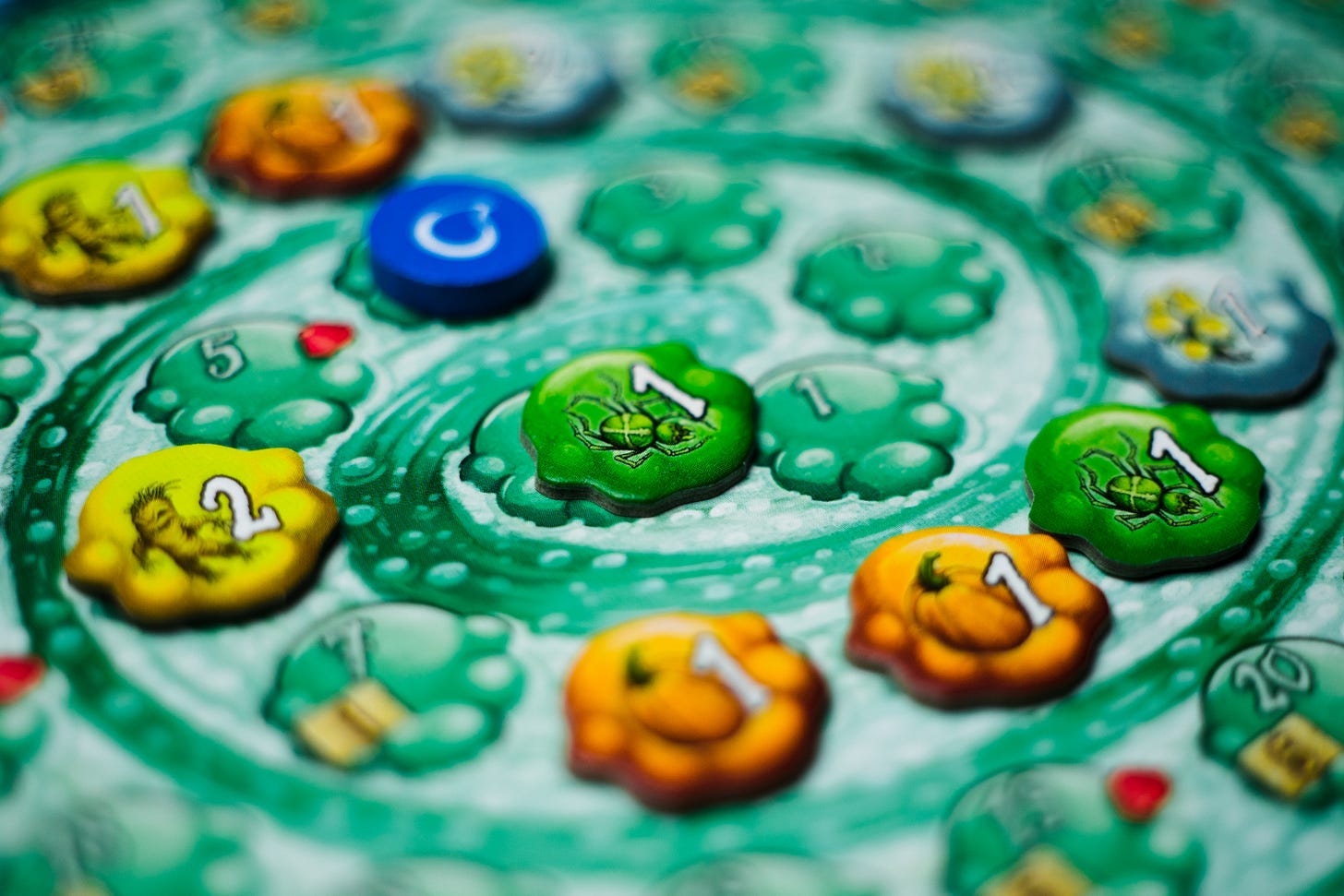Well, hello! As is tradition by this point, I should acknowledge that someday, I’ll be in your inbox more frequently, but I guess you know that by now. One of these days I’ll establish a good newsletter writing rhythm, but until then, I hope you’re enjoying the infrequent updates.
I’ve been thinking about how I’d like to write about The Quacks of Quedlinburg for a while now, and while I’ve definitely mentioned it in the past, this is the first time I’ve really focused on it exclusively. You might see more like that from me in these newsletters — but I’d welcome your feedback on that, so if you’ve got thoughts, please, feel free to leave a comment. I’ll include a button below that’ll take you straight there.
I don’t know that there’s much else in the way of housekeeping, so let’s just push onward with what I’ve got to say. I’ll include something afterward about what I’ve been reading lately.
I wanted to start this section by talking about one of my favorite games from 2018, but the further down that train of thought I got, the more I thought it wasn’t actually what I wanted to talk about. No, I want to talk about one of my favorite games, regardless of when it was published: The Quacks of Quedlinburg.
Beyond just being an interesting game that challenges players to think about their actions, it’s a game that does that while also amping the fun factor all the way up. It’s a game that wants you to turn the volume up all the way.
Designed by Wolfgang Warsch, the mind behind several excellent games, including The Mind (heh) and Ganz Schön Clever, Quacks is a push-your-luck game in which you and your opponents play as quack doctors concocting potions in a bubbling cauldron.
Each round, you’ll make a potion of (hopefully!) increased value over the previous round, which gives you the chance to buy more and more ingredients to put in your potion. The twist: You aren’t a very organized quack, and you put all of your ingredients in a bag, pulling them out one-by-one. Each type of ingredient produces a different effect, but you have to be careful — you also put cherry bombs in your bag, and if you have too many, the potion will explode in your face.
The mechanical premise is simple enough: Draw tokens from your bag, place them on your board, and decide to stop when you reach a tipping point. It’s straightforward push-your-luck in that way. The game tempts you into pushing that luck through more than just a simple “playing the odds” calculation, because those tokens you have in your bag? They have effects that might just change your game. Some might put a cherry bomb back in your bag, some will give you additional options, others still might move you further ahead or earn you a gem.
When you declare your completion in a round before exploding, you’re forced to weigh whether what’s left in your bag might not just be worth the risk, but also whether it’ll be more fun to find out. After all, you just spent your money the previous round getting a token you haven’t drawn, and you just know it’s exactly what you need.
The resulting game is both tense and uproarious, and it’s truly remarkable how well the game balances that act. And if that were that, Quacks would be a very nice game, but it wouldn’t be a Kennerspiel des Jahres winner. The Quacks of Quedlinburg holds magic in it the way the best games do. When somebody looks over at the table and asks what you’re doing, you might answer, “oh, we’re playing a game” — but I think you’ll also say something about how “we’re making potions, and so-and-so just blew up!” It’s a rare, inimitable quality that only the very best games hold inside.
Of course, Quacks has a few more things going for it: You can swap out ingredient powers as you play the game more and more, giving the game a bit of a refresh. They interact differently with each other, and you can mix-and-match until you find the perfect iteration of the game. The expansions offer something interesting but not altogether too disruptive from the basic concept of the game. They’re not necessary, unless you intend to play with five players often, but they can add that extra bit of variety if you just can’t get enough.
There you have it — that’s why I love The Quacks of Quedlinburg, and I hope that if you give it a try, you love it, too.
What I’ve been reading
I very recently finished Ted Chiang’s extremely good short story collection Exhalation, which is packed with stories that will stay with me for a long time. “The Merchant and the Alchemist’s Gate” is a story that took an established style and injected it with a thought-provoking time travel story. “What’s Expected Of Us” takes one maybe-impossible technological advancement and plays it out — and I want to tell you more about it, but I fear spoiling the discovery. “Anxiety is the Dizziness of Freedom” is completely stuck in my head, and sometimes, I wish I could talk to a parallel version of myself. I can’t recommend the collection highly enough.
As always, thanks for reading Don’t Eat the Meeples. You can find me reading science fiction short stories on my podcast Vintage Sci-Fi Shorts, and my Instagram account that’s a companion to this newsletter is also named Don’t Eat the Meeples.






Exhalation really is amazing. Thanks for the writeup!